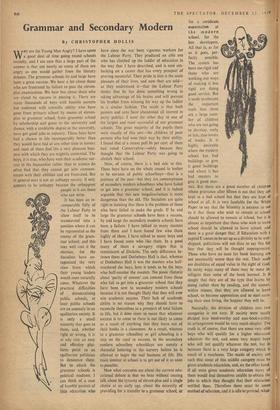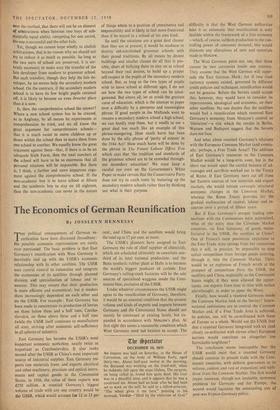Grammar and Secondary Modern
By CHRISTOPHER HOLLIS WHY are the Young Men Angry? I have spent a good deal of time going round schools recently, and I am sure that a large part of the answer is that not nearly so many of them are angry as one would gather from the literary debates. The grammar schools by and large have been a great success. We hear a lot about those who are frustrated by failure to pass the eleven- plus examination. We hear less about those who are elated by success in passing it. There are many thousands of boys with humble parents but endowed with scientific ability who have gone from primary school by means of eleven- plus to grammar school, from grammar school by scholarship and grant to the university and thence, with a creditable degree at the university, have got good jobs in industry. Those boys have had a chance in life incomparably better than they would have had at any other time in history and most of them find life a very pleasant busi- ness with which they are mightily contented. The boys, it is true, who have won their academic suc- cess in the humanities rather than in science do often find that they cannot get jobs commen- surate with their abilities and are frustrated. But in general ours is not an unhappy society. It only appears to be unhappy because the unhappiest people in it are those who can write.
It has been an in- comparable folly of the Labour Party to allow itself to be manoeuvred into a position where it can be represented as the enemy of the gram- mar school; and this may well cost it the election, for the Socialists have an- tagonised the very class from which their young leaders would most naturally come. Whatever the practical difficulties of democratising public schools, at least public schools are an anomaly in an egalitarian society. It is only a small minority that goes to them, and, whether right or wrong, it is at any rate an easy and effective plat- form point to an egalitarian politician to denounce them. But to attack the grammar schools is political madness. I can think of a case of humble parents of little education who have since the war been vigorous workers for the Labour Party. They produced an able son who has climbed up the ladder of education in the way that I have described, and is now em- barking on a career that has every prospect of proving successful. Their pride in him is the main pleasure of their lives, and now they are told— as they understand it—that the Labour Party thinks that he has done something wrong in taking advantage of his brains and will prevent his brother from winning his way up the ladder in a similar fashion. The result is that both parents and sons have abandoned all interest in party politics. I went the other day to one of the largest and most successful of our grammar schools. The great majority of the pupils there were exactly of this sort—the children of poor parents who had won their way by their ability. I found that at a recent poll 86 per cent, of them had voted Conservative—solely because they thought that the Labour Party was going to abolish their school.
, Now, of course, there is a bad side to this. These boys have on the whole ceased to bother to be envious of public schoolboys—that is a jealousy of the past—but they are contemptuous of secondary modern schoolboys who have failed to get into a grammar school, and it is indeed arguable that this new inegalitarianism is more dangerous than the old. The Socialists are quite right in insisting that there is the probletn of those who have failed to make the grade. If by and large the grammar schools have been a success, by and large the secondary modern schools have been a failure. I have talked to many masters from them and I have found few who think highly of them. I have talked to many boys and I have found none who like them. In a good many of them a savagery reigns that is reminiscent of Dickens. The only difference be- tween them and Dotheboys Hall is that, whereas at Dotheboys Hall it was the masters who half- murdered the boys, here it tends to be the boys who half-murder the masters. No pious rhetoric about 'parity of esteem' can conceal from those who fail to get into a grammar school that they have been sent to secondary modern schools because it is not thought likely that they will ever win academic success. Their lack of academic ability is no reason why they should have to reconcile themselves to a prospect of total failure in life, but it does seem to mean that whatever success is to come to them is not likely to come as a result of anything that they learn out of their books in a classroom. As a result, whereas to a grammar schoolboy or girl schooling is a step on the road to success, to the secondary modern schoolboy schooldays are merely a shameful loitering in the nursery before he is allowed to begin the real business of life. His main interest at school is to get out of it as soon as possible.
Now what concerns me about the current edu- cational debate is that we hear without ceasing talk about the tyranny of eleven-plus and a single choice at an early age, about the necessity of providing for a transfer to a grammar school, or for a certificate examination at the modern school, for the late developers. All that is, as far as it goes, per- fectly sensible. The system has been too rigid and those who are working out ways of making it less rigid are doing good service. But it tends to obscure the important truth that there are a large num- ber of children who are not going to develop, early or late, into lovers of books. It is highly desirable where the modern school has bad buildings to give it good buildings and where it has bad masters to give it good mas- ters. But there are a good number of children whose grievance after fifteen is not that they arc kept at a bad school but that they are kept at school at all. It is very laudable for the White Paper to say that the Ministry is anxious to see to it that those who wish to remain at school should be allowed to remain at school, but it is almost as important that those who wish to leave school should be allowed to leave school, and there is a great danger that, if Education with a capital E comes to be set up as a divinity to be wor- shipped, politicians will not dare to say this for fear that they will be thought unprogressive. Those who have no taste for book learning are not necessarily worse than the rest. Their souls are doubtless of equal value in the sight of God. In many ways many of them may be more in- telligent than some of the book learned. It is simply that they are of the type that learns by doing rather than by reading, and the sooner, within reason, that they are allowed to leave school, to become apprentices and to start earn- ing their own living, the happier they will be.
Naturally, the division of children into two categories is not easy. If society were neatly divided into bOokworthy and non-bookworthy, its arrangement would be very much simpler. The truth is, of course, that there are some very able boys who will qualify for a higher education whatever the test, and some very stupid boys who will not qualify whatever the test, but in between there is a very large category which is much of a muchness. The needs of society are such that some of this middle category must be given academic education, and, on the other hand, if all were given academic education many of them would find themselves unable to obtain the jobs to which they thought that their education entitled them. Therefore there must be some method of selection, and it is idle to pretend, what- aver the method, that there will not be an element of arbitrariness when between two boys of sub- stantially equal ability, competing for one award, the one is successful and the other fails.
Yet, though we cannot hope wholly to abolish arbitrariness, that is no reason why we should not try to reduce it as much as possible. So long as the two sorts of school are preserved, it is cer- tainly necessary to make easy the transfer of the late developer from modern to grammar school. But such transfers, though they help the late de- veloper, by no means help the secondary modern school. On the contrary, if the secondary modern school is to have its few bright pupils creamed off, it is likely to become an even drearier place than it is now.
Is, then, the comprehensive school the answer? Where a new school system has to be created, as in Anglesey, by all means let experiments at comprehension be tried, and we all know the great argument for comprehensive schools— that it is much easier to move children up or down within the school than to move them from one school to another. We equally know the great argument against them—that, if there is to be an adequate Sixth Form, then the total numbers of the school will have to be so enormous that all Personal relations will be impossible. But there IS, I think, a further and more important argu- ment against the comprehensive school. If the non-academic boy is to leave school at fifteen and the academic boy to stay on till eighteen, then the non-academic can never in the nature of things attain to a position of prominence and responsibility and is likely to feel more frustrated, than if he stayed in a school of his own kind.
So until the solutions are a great deal clearer than they are at present, it would be madness to destroy old-established grammar schools with their proud traditions. By all means by decent buildings and smaller classes do all that is pos- sible, short of bullying them to stay on at school beyond their real desires, to build up a proper self-respect in the pupils of the secondary modern school. But, as long as the two types of pupils wish to leave school at different ages, I do not see how the two types of school can be amal- gamated. But above all, let us avoid the greatest curse of education, which is the attempt to paper over a difficulty by a pompous and meaningless phrase. If good people in the Midlands want to rename a secondary modern school a high school, we can hardly stop them, but it smells to me a great deal too much like an example of this phrase-mongering. How much harm has been done by the silly phrase of 'parity of esteem' in the 1944 Act! How much harm will be done by the phrase in The Future Labour Ofiers You which says that 'the tradition and standards of the grammar school are to be extended through- out secondary education! We must keep a careful eye even on the Government's White Paper to make certain that the Conservative Party does not try to catch votes by buttering up the secondary modern schools rather than by thinking out what is their purpose.







































 Previous page
Previous page